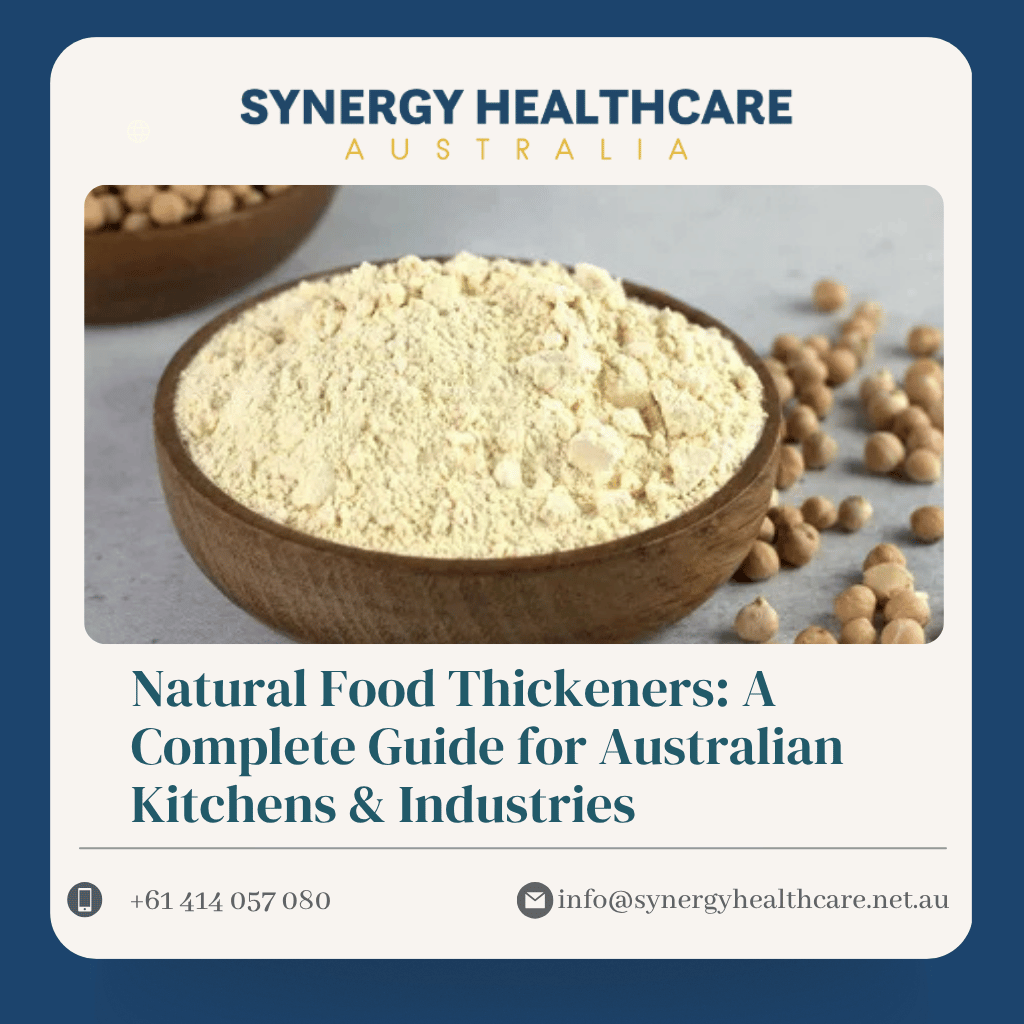If you’re looking for clean-label ingredients that improve food texture without synthetic chemicals, you’re not alone. From home cooks to food manufacturers, Aussies are turning to natural food thickeners for healthy, sustainable solutions.
Whether you’re sourcing from a reliable food thickeners supplier or experimenting with home recipes, this guide will break down what you need to know—types, benefits, uses, and where to get them in Australia.
What Are Natural Food Thickeners?
Natural food thickeners are plant- or animal-derived substances that modify food texture without altering taste. They’re used to enhance consistency, mouthfeel, and shelf stability of various products like soups, sauces, yoghurts, baby food, and desserts.
Common examples include cornstarch, guar gum, xanthan gum, pectin, and agar agar. Unlike artificial thickeners, these come from natural sources and are often non-GMO, gluten-free, and safe for daily use.
Why Use Natural Thickeners Over Synthetic Ones?
- ✅ Better digestibility
- ✅ Fewer allergic reactions
- ✅ No artificial chemicals or preservatives
- ✅ Aligned with clean-label and vegan trends
- ✅ Approved by FSANZ and FDA for safety
Top Natural Food Thickeners Used in Australia
1. Guar Gum
Derived from guar beans, guar gum is widely used in sauces, gravies, and ice cream for its high thickening power. It’s gluten-free and often preferred in keto or low-carb diets.
2. Xanthan Gum
Produced via fermentation of sugar with bacteria, this thickener is common in gluten-free baking. It enhances viscosity and prevents ingredients from separating.
3. Pectin
Extracted from fruit peels (usually citrus), pectin is a favourite in jam and jelly making. It provides a gel-like consistency without added sugars or additives.
4. Agar Agar
A seaweed-based vegan alternative to gelatin, agar is heat-stable and ideal for desserts, puddings, and even plant-based meat textures.
5. Arrowroot Powder
This starch from tropical plants is tasteless and clear, making it perfect for clear sauces and fruit gels.
6. Locust Bean Gum
Also called carob gum, it’s valued for stabilising dairy products and baby food. It’s heat-tolerant and works well at low pH levels.
7. Cornstarch
A staple in every Aussie pantry, cornstarch is economical, easy to use, and works in both savoury and sweet dishes.
Applications of Natural Food Thickeners in Different Industries
| Industry | Application Example | Preferred Thickeners |
| Food & Beverage | Sauces, gravies, bakery items | Xanthan gum, guar gum, arrowroot |
| Dairy | Yoghurt, cheese spreads | Locust bean gum, carrageenan |
| Baby Food | Purees, ready-to-eat jars | Pectin, guar gum |
| Nutraceuticals | Shakes, supplements | Xanthan gum, psyllium husk |
| Vegan/Plant-Based | Vegan meats, jellies | Agar agar, pectin |
Benefits of Natural Thickeners in Food Processing
- Improved Texture and Consistency
Perfect viscosity for sauces, gravies, soups, and beverages. - Extended Shelf Life
Some thickeners offer mild antimicrobial or stabilising effects. - Enhanced Nutritional Profile
Fibre-based thickeners like guar gum support digestion. - Compliance with Food Standards
Approved by Food Standards Australia New Zealand (FSANZ) and globally by the FDA.
How to Choose the Right Natural Thickener
Choosing depends on:
- Temperature stability (hot/cold)
- pH compatibility
- Vegan/gluten-free requirements
- Type of food product (liquid, gel, baked)
💡 Tip: For acidic recipes like tomato sauce, avoid cornstarch and use arrowroot or xanthan gum instead.
Natural Thickeners in Clean Label and Gluten-Free Trends
According to FoodIngredientsFirst, the clean-label food market in Australia is projected to grow by 7.2% CAGR by 2027. More Australians are reading labels and choosing products with fewer additives and more recognisable ingredients.
That’s why natural thickeners are now standard in gluten-free and vegan products in retail stores.
Where to Buy Natural Food Thickeners in Australia
You can easily find both retail and bulk options through trusted food additives suppliers in Australia. Look for:
- Organic or certified clean-label products
- FSANZ-compliant ingredients
- Technical documentation for industrial applications
Tips for Using Natural Food Thickeners at Home
- Mix with cold liquids to prevent clumping.
- Use sparingly—a little goes a long way.
- Store in airtight containers to prevent moisture absorption.
Conclusion
From baking and cooking to food manufacturing, natural food thickeners are essential for achieving the perfect texture without compromising on health. With Australia’s growing demand for clean-label, allergen-free ingredients, choosing the right thickener can make all the difference—for your product and your customers.
FAQs – Natural Food Thickeners
Q1. What are the most commonly used natural food thickeners?
Guar gum, xanthan gum, cornstarch, pectin, and agar agar are the most commonly used natural thickeners in Australian kitchens and food industries.
Q2. Are natural thickeners safe for babies and kids?
Yes, especially those like pectin and guar gum, which are used in many baby food formulations. Always check with your supplier for food-grade certification.
Q3. Can I use natural thickeners for gluten-free baking?
Absolutely. Xanthan gum and arrowroot are popular choices in gluten-free recipes as they help mimic the elasticity of gluten.
Q4. Are all food thickeners vegan?
No. While most natural thickeners like agar and xanthan gum are vegan, animal-derived gelatin is not. Always check product labels.
Q5. Where can I buy food-grade natural thickeners in Australia?
You can source certified options through food thickeners supplier websites like Synergy Healthcare, which offer clean-label, FSANZ-compliant ingredients.








